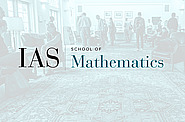2008-2009 Seminars
Dec
15
2008
Computer Science/Discrete Mathematics Seminar I
Direct-Product Testing, and a New 2-Query PCPs
11:15am|S-101
Dec
09
2008
Dec
08
2008
Special Computer Science/Discrete Mathematics Seminar
Cutoff Phenomena for Random Walks on Random Regular Graphs
Eyal Lubetzky
4:00pm|S-101
Dec
08
2008
Computer Science/Discrete Mathematics Seminar I
Convergent Sequences of Sparse Graphs
Bela Bollobas
11:15am|S-101
Dec
02
2008
Computer Science/Discrete Mathematics Seminar II
Combinatorial Reasoning in Information Theory
10:30am|S-101
Dec
01
2008
Computer Science/Discrete Mathematics Seminar I
Derandomizing Algorithms on Product Distributions
Avinatan Hassidim
11:15am|S-101
Nov
25
2008
Computer Science/Discrete Mathematics Seminar II
Complexity of Equational Proof Systems
10:30am|S-101
Nov
24
2008
Special Computer Science/Discrete Mathematics Seminar
Quantum Algorithms Using the Curvelet Transform
Yi-Kai Liu
4:00pm|S-101
Nov
24
2008
Computer Science/Discrete Mathematics Seminar I
Large Induced Trees in $K_r$-Free Graphs
Jacob Fox
11:15am|S-101
Nov
18
2008
Computer Science/Discrete Mathematics Seminar II
Complexity of Equational Proof Systems
10:30am|S-101
